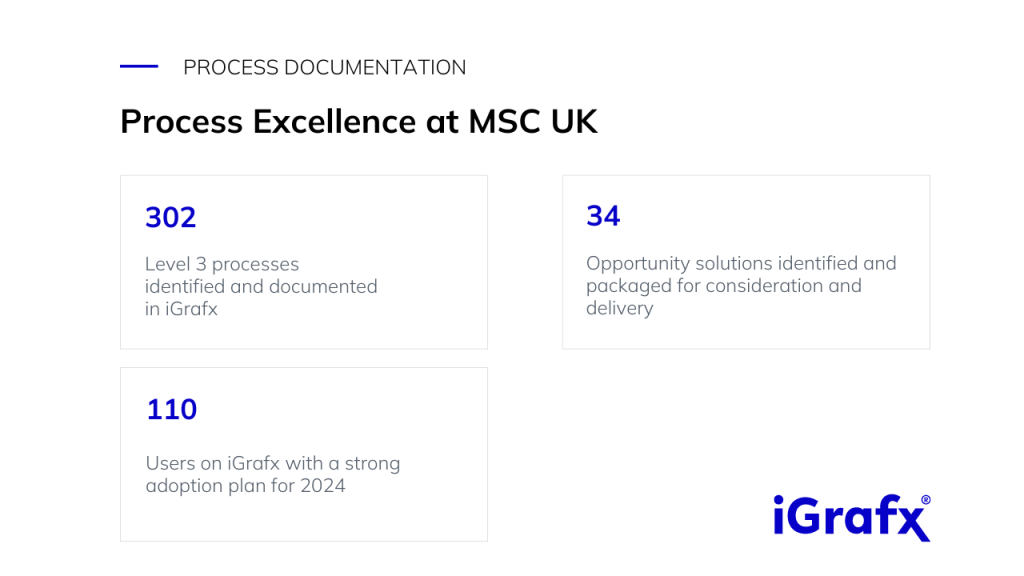In the realm of shipping, MSC stands tall as the world’s largest shipping container company, managing a fleet of 730 vessels across 155 countries with a global network of over 600 offices. While MSC UK’s roots trace back to a humble shoe shop in Hull, their growth has been organic, emphasizing tradition and values inherent in the shipping industry.
Business Process Excellence: Navigating Complexity
As MSC UK expanded, the complexity of operating in diverse industries and complying with various regulations became apparent. Dealing with global compliance requirements, including GDP rules and food-grade standards, demanded a strategic approach. MSC UK’s services extend beyond maritime operations, covering land movements and tailored solutions for diverse clientele.
In the early days, communication among the four founders above a shoe shop was seamless. However, growth led to increased complexity, unintentional silos, and challenges in understanding end-to-end processes. To overcome this, MSC UK knew they needed a new approach for Business Process Excellence (BPE) to enhance visibility and break down organizational barriers.
Implementing Business Process Intelligence & Management at MSC UK
Recognizing the need for a structured approach, MSC UK turned to iGrafx Process360 Live as a solution to manage the intricacies of its business processes. The implementation involved setting clear rules, establishing a digital twin of the organization, and ensuring consistent standards. This move from a maze of interconnected processes to a clear roadmap marked a significant shift for MSC UK.
The company recognized that with such a high level of complexity within the business, a strong process management system was required, rather than the few process maps that were initially in use. MSC UK knew that when they were repeatedly coming across continuity issues, “it was a bit like a bowl of spaghetti trying to unfurl what was going on”.
When MSC UK started looking for technology that could become their Business Process Intelligence and Management solution, they first thought of Visio diagrams and documents. However, as a solution was required for the entire company, and with a high level of complexity, a more robust tool was sought after.
MSC UK partnered with consultancy BPM-D to guide them through the setup and ensure their journey to process excellence was smooth sailing. Rachel Bellinger, Quality Manager at MSC UK, said, “We know shipping, we know our business, but we don’t always know the best ways in which we can implement business process and how we can get the most from it.” With BPM-D and iGrafx, MSC UK’s journey to establishing a centralized internal business process management capability had begun.
Process Governance at MSC UK: Establishing Clear Roles
To ensure sustained success, MSC UK embraced a governance model, defining roles and responsibilities. The wider business acts as content owners, providing insights into daily operations, while a dedicated framework designer oversees the alignment of processes with business objectives. This approach ensures cross-functional collaboration and clear communication channels.
MSC UK required a process intelligence and management platform to gain visibility, and to understand what goes both upstream and downstream, without physically having to do the job itself. Rachel says, “Our Digital Process Twin enables us to be able to connect a lot of information in one place to become the single version of the truth. It means that what iGrafx can do in six months is something I would have taken years to achieve manually.”
Establishing a Governance Interaction Model
In response to the evolving landscape of MSC UK’s operational complexity, a governance interaction model has been crafted to elucidate existing platforms and meeting structures. The board meeting serves as the top-tier directive source, guiding the business review meeting attended by sponsors. This interaction cascades down to individual departments, fostering cross-functional collaboration. Noteworthy is the involvement of local process owners and PMOs, ensuring adaptability to changes that span multiple functions. The process then extends to teams within departments, incorporating process owners and collaborators for comprehensive insights into ongoing operations. This seamless communication structure, integrated into existing organizational forums, transforms business processes into a strategic agenda item rather than an additional meeting obligation.
Beyond the governance model, MSC UK is keen on cultivating a collaborative community within the organization, uniting individuals already inclined towards business process intricacies. This community, under the guidance of business process managers, acts as a liaison between departments and the overarching organizational goals. Simultaneously, the integrated management system (IMS) plays a crucial role, intertwining business processes with risk, compliance, quality, security, health and safety, and sustainability frameworks. This collaborative approach ensures that decision-making aligns with business strategies and adapts to the intricacies of MSC UK’s global operations, ultimately paving the way for an agile and informed future.
iGrafx played a pivotal role in reshaping how MSC UK approached its business processes. Utilizing its capabilities, MSC UK modeled 302 processes, reaching a level of detail where processes named as ‘continents, countries, and counties’ became distinguishable. Process360 Live enabled a clickable dashboard, fostering a clear understanding of processes, their interconnections, and the information flow.
Process Mining: Uncovering Operational Insights
In the pursuit of continuous improvement, MSC UK is exploring process mining from iGrafx to gain real-time insights into process performance. This involves tracking the actual utilization of processes, identifying bottlenecks, and understanding user behavior against the perceived process which are captured in the process modelling. Such process intelligence allows for informed decision-making and targeted improvements.
Simulating Change: Planning for Impact
As part of its future vision, MSC UK aims to leverage process simulation, to forecast the impact of process changes before implementation and to ensure the correct and optimal decisions are made. This strategic step involves envisioning how process alterations, even seemingly minor ones, might reverberate across the organization. Through simulation, MSC UK aims to streamline decision-making processes and mitigate unforeseen challenges.
Conclusion: The Road Ahead
Regardless of the tools and technologies implemented—whether it’s traditional paper maps, modern modeling, or futuristic simulations—governance remains a linchpin at MSC UK. The company now enjoys clear rules of engagement, ensuring a harmonious and well-coordinated approach to navigating the complexities of the shipping industry.
As MSC UK continues its journey towards operational excellence, the focus remains on combining historical business knowledge with cutting-edge process intelligence tools. The aim is not merely to map processes but to leverage insights for informed decision-making, enabling MSC UK to navigate the complex shipping landscape with agility and resilience.
Interested in exploring how proven process intelligence and management could have an impact in your organization? Contact us today for a demonstration and discussion.


